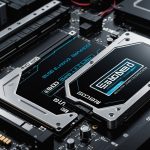Overview of SSDs and HDDs in Gaming
In the dynamic world of gaming, storage solutions such as SSDs (Solid State Drives) and HDDs (Hard Disk Drives) play a crucial role in shaping players’ experiences. These storage media serve as the backbone for gaming systems, each offering distinct functionalities. SSDs utilise flash memory to store data without moving parts, leading to faster data retrieval and write speeds. In contrast, traditional HDDs use spinning disks and read/write heads, which generally results in slower performance but often greater storage capacity.
Historically, HDDs have been more popular in the gaming market due to their cost-effectiveness and large storage options. However, as gaming technology has evolved, SSDs have gained traction for their superior speed and performance. This shift is particularly significant in competitive and high-end gaming, where even milliseconds count towards improving gaming performance.
Have you seen this : Exploring the hidden dangers of purchasing pre-owned computer hardware
The choice between SSDs and HDDs can significantly impact a gaming experience. SSDs enhance game load times, resulting in less waiting and more seamless transitions. On the other hand, HDDs might still appeal to gamers who need extensive storage at a lower cost. For gamers, understanding the implications of each storage type becomes essential in crafting the optimal gaming setup.
Speed and Load Times
In gaming, load times and data transfer rates substantially affect overall game performance. SSDs notoriously outperform HDDs when it comes to read and write speeds due to their lack of mechanical components. An SSDs uses integrated circuits which dramatically quicken data access, leading to blazing-fast game loading and installation times. Conversely, the mechanical nature of HDDs, involving spinning disks, results in slower data retrieval.
Also read : Maximize Your Intel NUC 8 Experience: Essential Firmware Adjustments for Superior 4K Streaming
The difference in speed can be quantified with benchmarks. For instance, an SSD can achieve read/write speeds upwards of 500MB/s whereas an HDD often maxes out at about 150MB/s. This means, in practical scenarios, games stored on SSDs tend to launch faster, reduce in-game stuttering, and enhance gameplay fluidity.
When considering game performance, these differences translate into tangible advantages for SSDs. Quick load times are not just about reduced waiting; they can mean the difference between victory and defeat in fast-paced gaming environments. The rapid data access provided by SSDs gives players a competitive edge, making them tremendously appealing for those seeking optimal performance. This performance leap is evident in high-end gaming systems where the demand for speed is at its peak.
Durability and Reliability
When evaluating storage options, durability and reliability are crucial factors for gamers. The primary distinction between SSDs and HDDs lies in their construction. HDDs operate with spinning disks and mechanical arms, thus increasing susceptibility to physical damage and wear and tear. In contrast, SSDs utilise flash memory with no moving parts, enhancing their durability and resistance to physical shocks.
Data loss is a significant concern within gaming, particularly for games with large data files. HDDs, due to their mechanical nature, often exhibit higher failure rates over time. This can lead to potential data loss, jeopardising saved game files and causing data integrity issues for gamers. On the other hand, SSDs lack moving components, which typically translates to lower failure rates, providing greater peace of mind.
In terms of hardware longevity, SSDs are considered to have superior durability, offering a longer lifespan compared to HDDs under similar usage conditions. For gamers, this reliability can mean less downtime due to hardware failures and a more seamless gaming experience over the years. Opting for SSDs could be advantageous for those prioritising long-term performance and reliability in their gaming setups.
Price Considerations
When evaluating cost analysis for gaming storage, comparing the price per gigabyte of SSDs and HDDs is vital. HDDs traditionally offer an economical solution, boasting lower costs per gigabyte, which is appealing for gamers needing expansive storage without breaking the bank. Conversely, SSDs come at a premium, reflecting their superior value for performance in high-speed gaming scenarios.
Understanding the value relative to gaming performance improvements is crucial. SSDs, despite their higher cost, deliver remarkable enhancements in speed, which can justify their investment for gaming enthusiasts prioritising quick load times and seamless transitions. Meanwhile, the affordability of HDDs makes them a sensible choice for those seeking quantity over speed, balancing budget constraints with storage capacity.
For gamers on a budget, blending both storage types offers a versatile solution. Implementing a smaller SSD for core gaming titles and an HDD for bulk storage maximises performance without overspending. This hybrid approach optimises cost efficiency, ensuring that gamers achieve the desired balance of speed and capacity tailored to their specific needs. Thus, careful consideration of both price and performance value is key in selecting the ideal storage solution.
Recommendations for Gamers
When selecting storage media for gaming, understanding different scenarios is key. For those seeking best SSDs to boost gaming performance, options like the Samsung 970 EVO Plus and the WD Black SN850 stand out due to their impressive read/write speeds and reliability. These storage solutions excel in delivering quick load times, ideal for competitive gaming environments where every millisecond counts.
On the other hand, gamers prioritising storage capacity over speed may prefer best HDDs like the Seagate BarraCuda or the WD Blue. These offer a cost-effective way to store extensive game libraries without compromising the budget. While they may not match the speed of SSDs, they provide ample space for casual or retro gamers who don’t have immediate speed requirements.
Custom recommendations consider individual needs. For mixed setups, a combination of a small SSD for game installations and an HDD for storing large files can be potent. This hybrid solution balances cost-efficiency with enhanced performance, ensuring gamers aren’t left waiting for load screens or struggling for storage. Tailoring storage solutions to fit personal gaming styles and budgets ensures the best gaming experience for players at varying levels of engagement.
User Experiences and Testimonials
Navigating the realm of gaming storage, players often turn to user reviews for insights on choosing between SSDs and HDDs. Player feedback reveals the tangible influence these storage solutions can have on the gaming experience. Many gamers favour SSDs given their ability to significantly reduce load times, enhancing immersion and fluidity during gameplay.
Testimonials frequently highlight noticeable speed differences. SSDs are praised for quick boot times and seamless transitions between game levels, while HDDs are often commended for offering ample storage at a fraction of the cost, albeit with slower performance. Such user reviews underscore the importance of assessing personal gaming priorities.
Case studies present clear examples of performance benefits. For instance, competitive players attest to the pivotal role SSDs play in ensuring rapid data access in high-stakes environments, preventing costly lag and interruptions. By contrast, casual gamers might opt for HDDs to stockpile a wide range of games without encountering space constraints.
Engaging with feedback from the gaming community offers prospective buyers realistic expectations. Whether it’s from competitive esports players or vintage game enthusiasts, these insights can guide smart storage choices aligned with individual gaming styles and budgetary needs.











